Dear Ballroom Houses, here comes a letter from Love Lazers for you. We want to talk about ignorance and rejection, about young Colombian Ballroom performers, freshly tested and HIV positive. And we wanna talk about our options for action and responsibilities. (June, 2023)
We are writing to you, because it’s time to talk about something. We have been connected to you and your world for some years now, and we appreciate what you are doing.
We are writing to you, because a few time ago we organised our second kiki ball in Colombia. We called it KIKI VIRAL and it was held by Ballroom Pereira and us Love Lazers together. Here, we want to share with you what we’ve learned and what questions came up and remain unanswered. We understand that the Houses1By the ‘60s, Ballroom culture was in full effect, and collective “houses” formed to create a safe place and family structure for young queer kids who were often rejected by their biological families and were essentially homeless. At a Ball, the houses function like teams at a sporting event. While competition is the structure of a ball, it’s the creative and community experience that animates ballroom culture. For kids who are a target of hate and confusion in the outside world, the runway is a safe zone to express their creativity and talent. It’s a for them to feel fabulous and special. are important actors in the prevention and handling HIV+ cases and want to raise awareness about this. We also want to encourage you to enter into a discussion with us about it.
First, we can say our ball KIKI VIRAL was a banger: Pereira’s vibrant Ballroom scene, a young and fresh crowd, newly founded Ballroom Houses, extravagant moves and moving dance. Dances about HIV-associated themes such as reacting to rejection, the exclusion and stigmatisation of HIV in the Colombian health system (the walk of shame, the walk of anger). Between the dance categories we created a calm and protected place together where talking about HIV was possible. We were left breathless by the intensity of the speeches and the dance expressions! We would like to express our deepest respect and thanks to all of you!
With the KIKI VIRAL, we have combined the topics of living with HIV and PrEP. In our opinion, people with HIV have needs and rights which do not have to be legitimised through active efforts of prevention. An effective HIV therapy is good for the user, whose viral load is undetectable. It is a great side effect of the medication to suppress the virus transmission completely and not being contagious to others anymore (indetectable=intransmissible). Our Ball introduced this knowledge to those who didn’t know about it yet.
We had actually planned to address the issue of the “responsibility of the Houses” during our kiki ball. However, this question remained open and we are asking it now here.
We as an activist group have been cooperating with the ballroom scene and other independent nightlife participants for a long time. Since the House of Tupamaras supported our first leaflet “Ready for PrEP (in Colombia)”, our fight for wide access to PrEP has continued for years. Unfortunately half of our friends have become pos+ in the last five years and that’s why things are so obviously urgent for us. Not everyone knows much about the relationship between HIV and the Ballroom scene (in Latin America and migrant communities). So let’s have a short look at the topic.
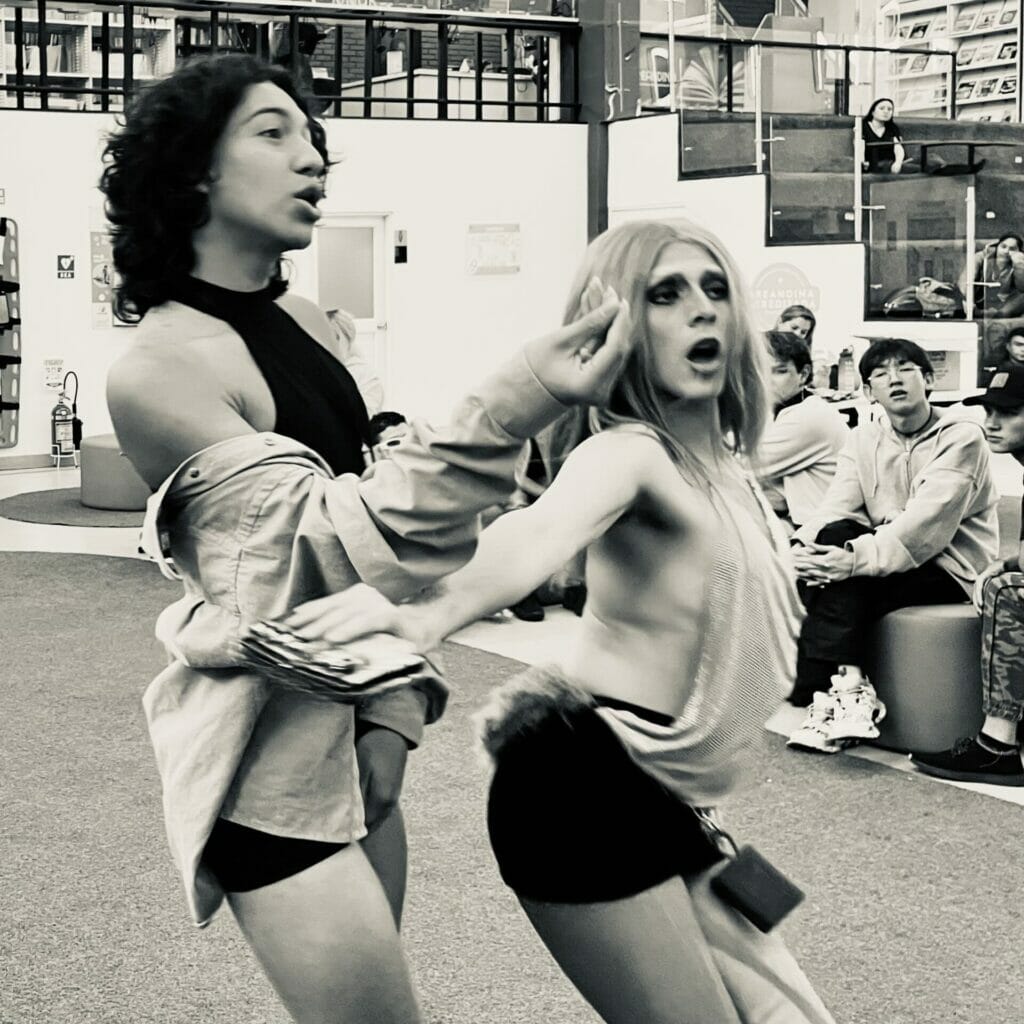
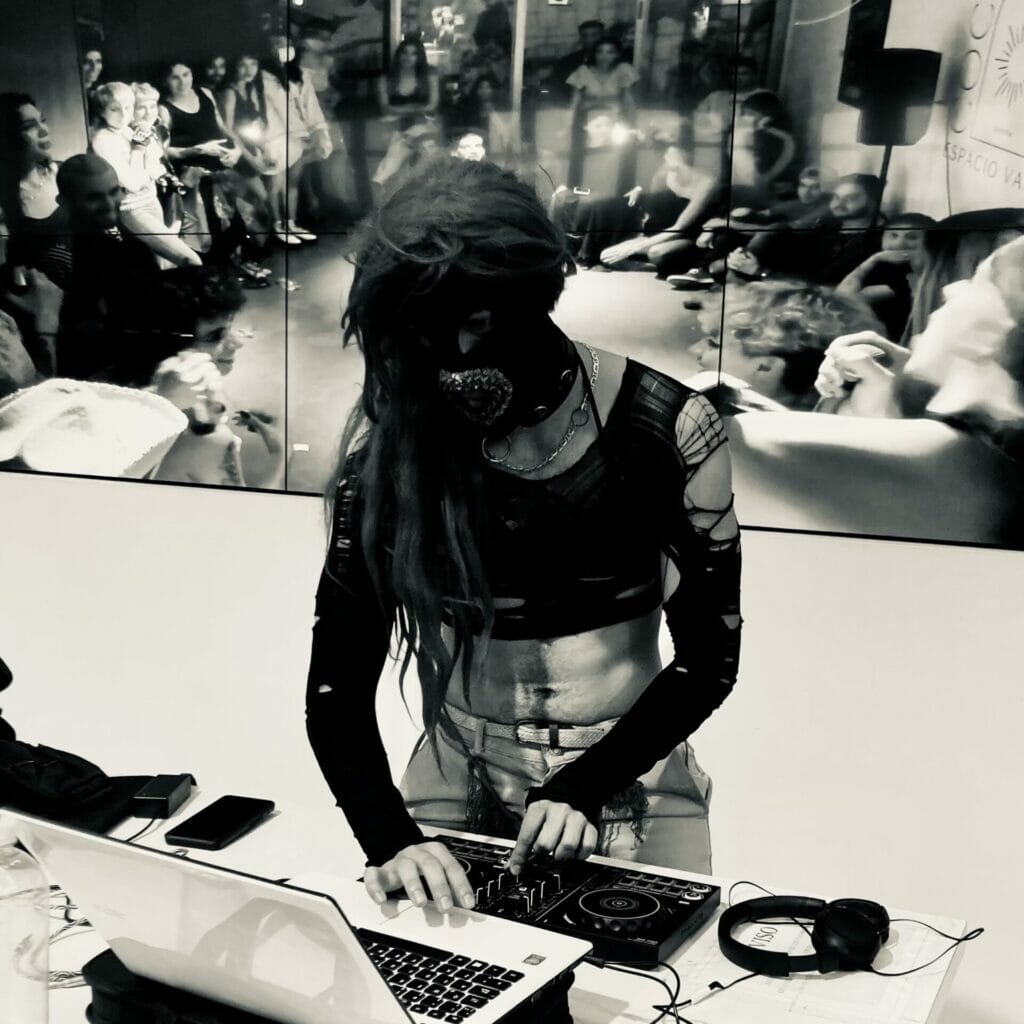
BALLROOM, HIV AND HISTORY
Many of us have learned through series like “Pose” (USA, 2018) that Ballroom culture, especially in the late 80’s, was deeply linked with HIV. “Paris is Burning” (USA, 1990) – and the debates surrounding the film after its release – had opened our eyes in the 1990s: the majority of the protagonists were HIV-positive and their living situation was characterised by contracting HIV, but also racism, poverty and street violence, especially homo and trans-phobic violence. Many in the ballroom scene died, after being left to languish in the most precarious, undignified conditions – often without access to medication and medical care. HIV rates were visibly higher in the Afro American and Latin American communities. Access to information and resources was poorer, and therefore significantly more people became infected with HIV there. But what was life as an HIV+ person in Colombia like at that time?: In Fernando Molano’s autobiographical novel Vista Desde una Acera, the two protagonists Fernando and Adrián discover their sexuality in unfavourable environments of the 80s and in the 90s,and the agony of one of them is described, as they become a victim of HIV. The ignorance and contempt from the health system and society are thematised.
In Colombia, in 1984, Manuel Velandia was the first person who publicly talked about HIV after the very first case of an HIV infection was reported in the country. As the journalist Luis Cañón told in his book Peregrinos del sida (1995), Manuel organized a first public conference about HIV in the bar AMIGOS in Bogotá, on June 28th of 1984, CSD (Christopher Street Day, today called Pride Day). While worldwide HIV was reported to infect only homosexuals, the very first case in Colombia was a sex worker woman, who died of AIDS in Cartagena days before the conference. Until the mid 1990s, Manuel, who ran a foundation called Apoyemos, used to receive calls from various people who needed advice and someone to talk about the virus. Calls came from hiv positive people and their relatives as well as researchers. In the years after this in Colombia, medical care and HIV prevention were always behind global standards and national infection rates comparatively high.
But now more than 30 years later, even though we have effective new tools to prevent HIV infection for years, in Latin America we still get infected with HIV. New infection numbers are constantly high and still rising in Colombia! Today the Ballroom Houses are full of young, HIV-positive dancers, stigma is in the air, shame and hiding, accusations and fear, some becoming seriously ill with full blown AIDS, without health insurance or medical treatment.
As in other places, it was the Ballroom Scene where people came together who are kicked out of their homes because they are trans, queer or/and HIV positive. People who have to live or work on the streets, who don’t fit into straight society. The houses are often the last refuge and home of the outlaws.
AND TODAY? – STRIKE A POS+
In the last years, in Colombia balls have already been organised on the topic HIV, and in some cases the title has been used to make a statement for HIV+, for example at the ball “VIHviendo la fantasía” hosted by Neni Nova at the Cinemateca de Bogotá (2022), Neni named the main message of this ball: “The most important thing is to know what your serological status is, not to avoid it.” It looked like the activist efforts of other balls in the last few years did not go beyond the title (at least publicly). Balls were giving space to collect donations for HIV community projects, for mourning lost, deceased members + friends and for the support of prevention campaigns like the “Dame PrEP-AYA” Ball collectively organised by Frente de Resistencia Transfeminista y Marikón together with us in Pereira (2021), which promoted PrEP as new safer sex method.
Lukas Fauno Tropikalia, member of the Argentinian ballroom scene told us: “It seems that HIV is not talked about, and our sisters continue to die, and the deaths are not always physical. There is also the death of identity, it is the death that prevents us from being ourselves, expressing ourselves, showing ourselves, sharing ourselves. That death by which we stop doing things. And the identity death to which those closets drag us, such as the HIV closet, is often something that we must address among all of us.”
Another very personal statement was made by our close friend Esteban from Bogotá in the article “HOMEWORK”. For years we have been fighting together with him as activists to get access to PrEP in Colombia. Trying to get PrEP by EPS was impossible for Esteban and he turned HIV positive after some months of struggling with the health system. The privatised health care market had nothing to offer him. It reminds us that we all are acting in capitalist conditions and we support every proposal to change the Colombian health system following the needs of the people, not the profit of the companies. The struggle for a better health system is currently taking place in the political sphere. There is, however, great pressure from economic elites to obstruct the reforms that seek precisely to humanise the health system promoted by the current government.
Sebastián Caraballo, a.k.a. Bicha TPK, a professional dancer and ballroom member from Uruguay based in Argentina, mentioned in a podcast in 2019: “We don’t talk about HIV until it passes through our bodies or orbits around us”.2Podcast “Danza Hedonista” by Mery Arias about body and sexuality. The episode “A tu discurso le falta virus” with Sebastián Caraballo, a.k.a. Bicha TPK, was recorded and published in 2019, The podcast talks about their personal project
Bicha TPK said also “After the diagnosis my life changed completely. As I was able to work on it and I took in a lot of information, I didn’t pass on the information about my diagnosis to my mother (the biological mother is meant, note by Love Lazers) with fear, and she wasn’t afraid of it either. So from then on, when I was working on my more personal things, I wanted to generate something, but I didn’t know what. In this decision for doing activism, the concept of visibility as an HIV-positive person arose. And I understand that it is something very important to this day that I often have to clarify: I don’t say that I have HIV because I like to show off with my virus, far from it, or because it is something I am proud of, but because it is precisely from a political point of view, as a political weapon and strategy at some point”.
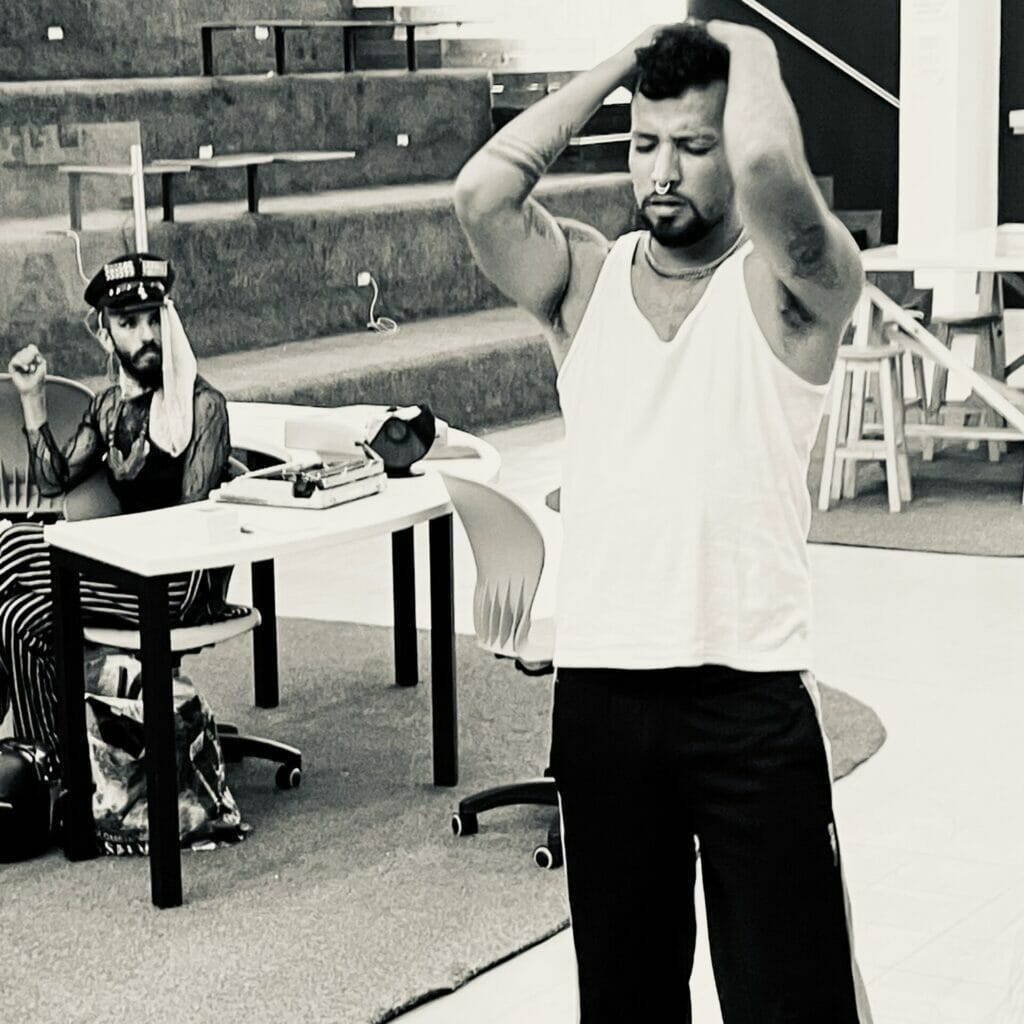
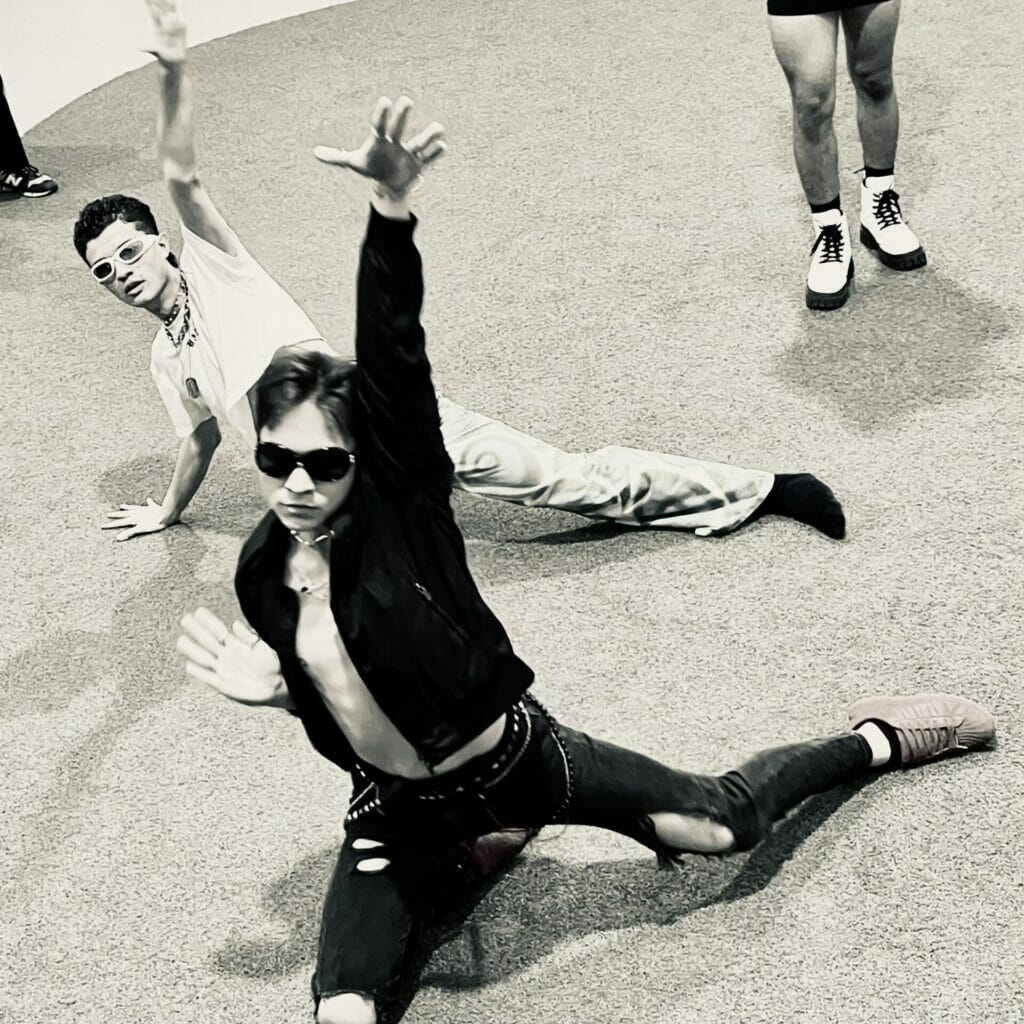
POSITIVE FLASHLIGHTS
Living in Colombia and being HIV positive means living under a stigma, in which anonymity always looks like being your best refuge. We are therefore thankful that we got some statements at our open microphone at our KIKI VIRAL:
“When I got a positive test I realised all the stigmas I was still carrying about living with HIV. Fortunately, I’ve had the ALT.haus which is my main family and my community and have been supporting me from the moment of the result and during the process of finding a treatment. What I’ve learnt about my experience with HIV is that we’re not a diagnosis, we’re people who deserve to live freely and without fear or stigma.” (ALTocalcifílico from Pereira)
“When I got positive tested on 2019, I faced depression and suicidal thoughts, and I didn’t want to keep going to the psychology appointments because the only psychologist hired in the EPS in my town keeps perpetuating stigma in her professional practice. I’ve realised how important it is to talk about HIV and mental health in the queer/trans/BIPOC diverse scene.” (Eduard)
“In the mid of the nineties, in the middle of the HIV crisis, I went to several balls in NYC and there HIV was a serious issue on the dance floor and on the street after the balls. So many of my friends have tested positive. For me HIV has always been connected to what ballroom stands for: building community, collectively taking care of each other, and providing safer spaces for queer, trans and also for BIPOC populations. One thing that I learned is still valid for me today: We have only us. And we walk this path together, till today.” (Falk)
We’ve learned on this day that such a space for open discussion is essential. It is usually missing and we need more of it.
For a more general perspective THE POETIC TYPEWRITER helped us to communicate our thoughts and fight the muting of our ideas about community. Therefore we installed a real typewriter at the KIKI VIRAL. We’ve collected the most private and secret secrets written down anonymously and stored in an archive. The secrets were accessible to all those who curiously wanted to read them, mirror themselves poetically in them, fabulate, speculate and imagine fantastic outcomes of real moments. – What does it have to do with HIV? Well, HIV is nothing special: something that produces conflicts sometimes or simply is a part of our lives, even a good one for some.
Group realities transcend the individual experiences, as Patricia Hill Collins said: From a feminist standpoint there is a need to look at shared experiences under hierarchical power relations. The most modernist notions speaking about individuality “reduce the significance of group consciousness and ‘voice’ within an entire structure of power and experience.”
The archive of secrets goes beyond a narrow scope: others have various issues and so much connects us and is familiar to us. Let us learn from each other. The archive will continue to record secrets, via our travel typewriter on different continents. The same applies to the need to talk about HIV: we at Love Lazers are discussing new forms of creating a protected space for mindful thought exchange in the near future. The Ballroom Houses can help provide this space and start the talk!

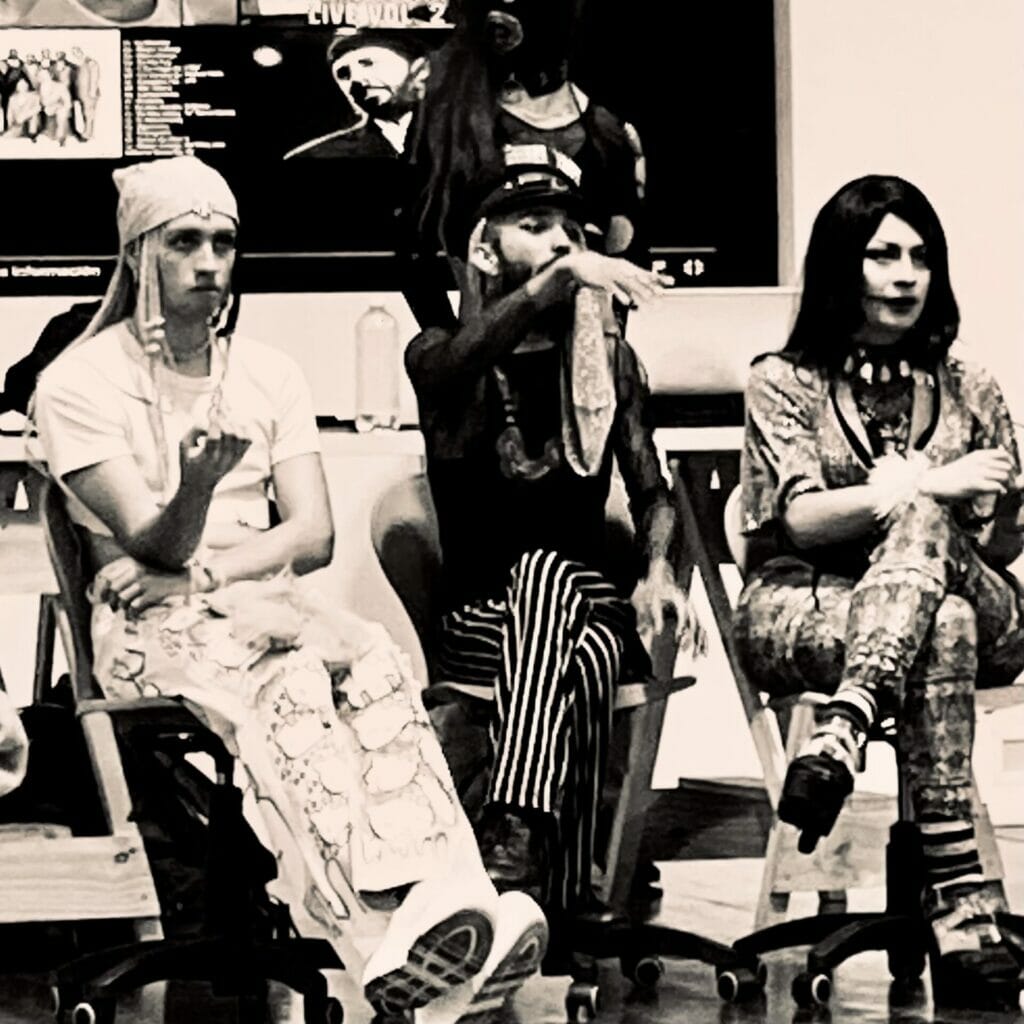
GETTING TESTED POS+ TODAY
We’ve provided on-site testing by a mobile lab while our kiki ball. It was offered by the local government office of public health and social security of the city of Pereira (they also provide free quick-result tests every friday at their place at 19th Street # 5-33) to our KIKI VIRAL. The fact that during our event participants were confronted not only with their positive test results for STI, but also for HIV, hit us very hard – not only because our audience were especially young people. It also shows that our fight is far from over: Nobody is alone. No one should be alone. At the same time, it is good that the testing was happening here and not later or at any other moment. Today is here and our lives are now.
WHY LOVE LAZERS IS NOT A HOUSE?
We are an activist group without a legal status which feels close to the ballroom scene as we share some of the same problems and challenges. As a group we are valuing our independence. We are nightlife addicted. We are free minds. Some of us are positive, others are negative or untested. Some of us have experiences with and in the ballroom scene as well as with underground techno. Perhaps somewhat differently from the houses, we function in a very text-based way: we see our mission as providing serious information that expands the possibilities of the individual concerning a joyful sexuality, freedom rights and emancipation. We are activists and don’t let anyone take away our resistance. All this and the fact that some of us are migrants from Latin America in our Berlin group is what connects us so strongly to the ballroom scene over the years.
SAFER BALLROOM
While preparing the KIKI VIRAL, we discussed the extent to which the Ballroom Scene is a productive and safe space for its members. We sometimes have the impression that the ballroom scene is a stage for a relentless dispute on social media and for cancel culture, for arguing about who is right, for gossip and communicative competition.
Seen from the perspective of pos+ house members, a house is (temporarily) a refuge and the social cohesion of it should not be a runway: we all want to be loved and accepted as persons, because we are, not because we perform something. It seems to us that this is not always the case or is misunderstood in practice.
However, we are also aware that to propose the house as a non-capitalist safe space and creating a solidarity environment while we are still living under de facto capitalist conditions can be seen as a lifestyle choice or privilege that very few can afford these days. On the other hand, such a space is perhaps more vital than ever to stand together and not drown in the neoliberal waves. We invite you to discuss this exciting topic more with us!




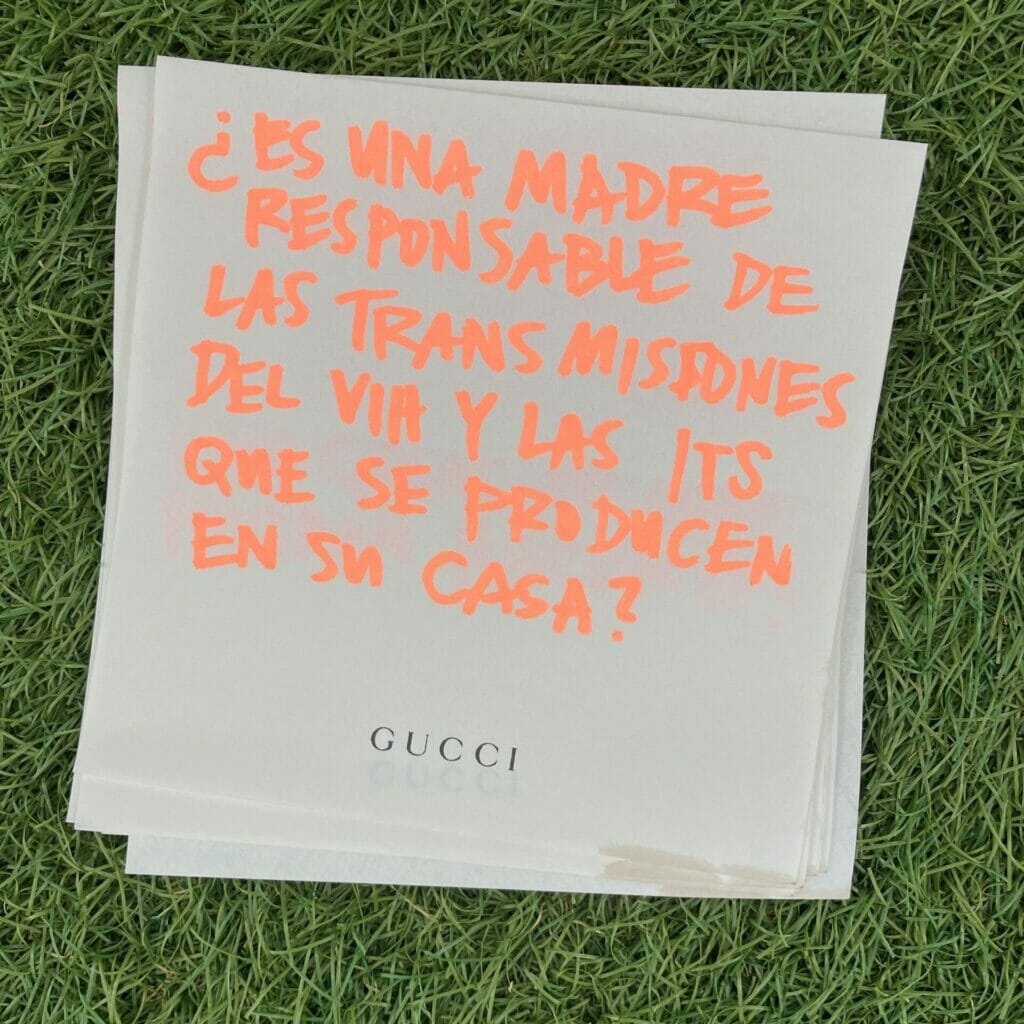
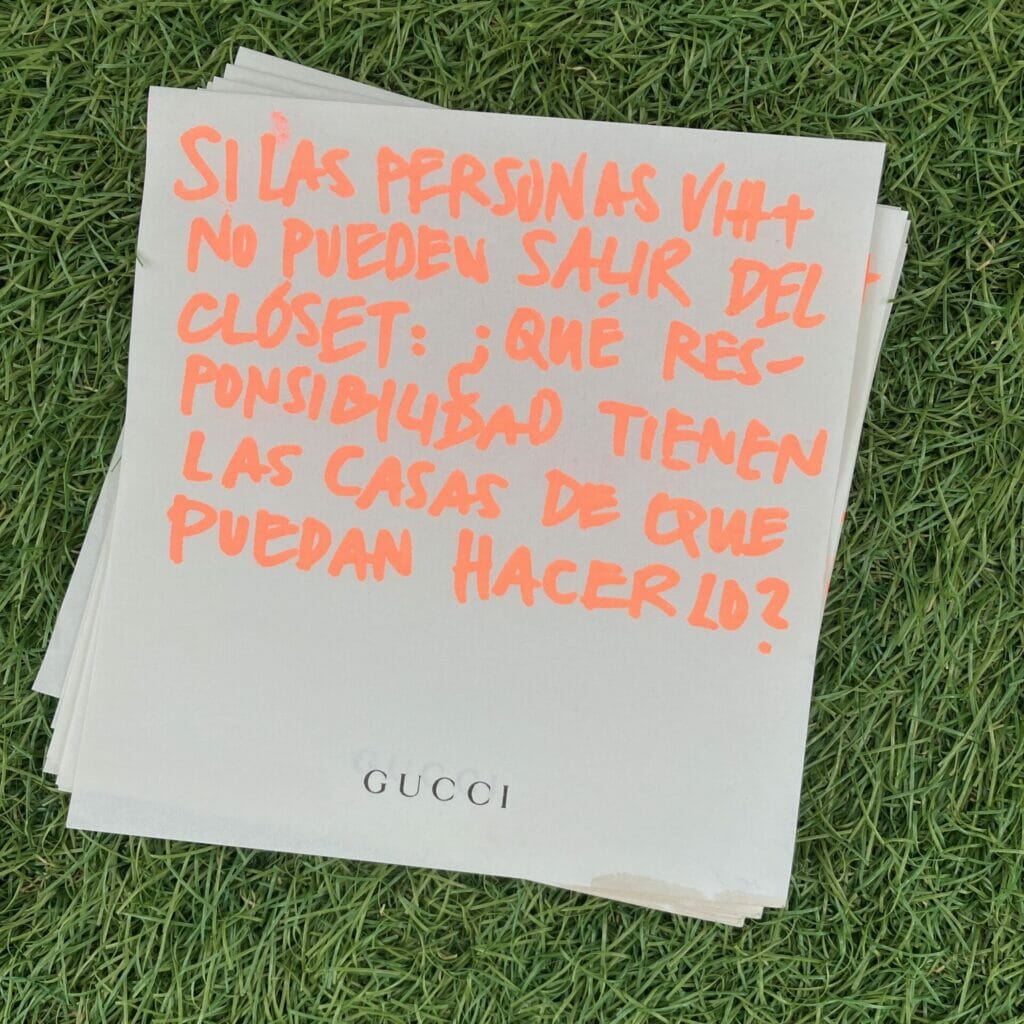

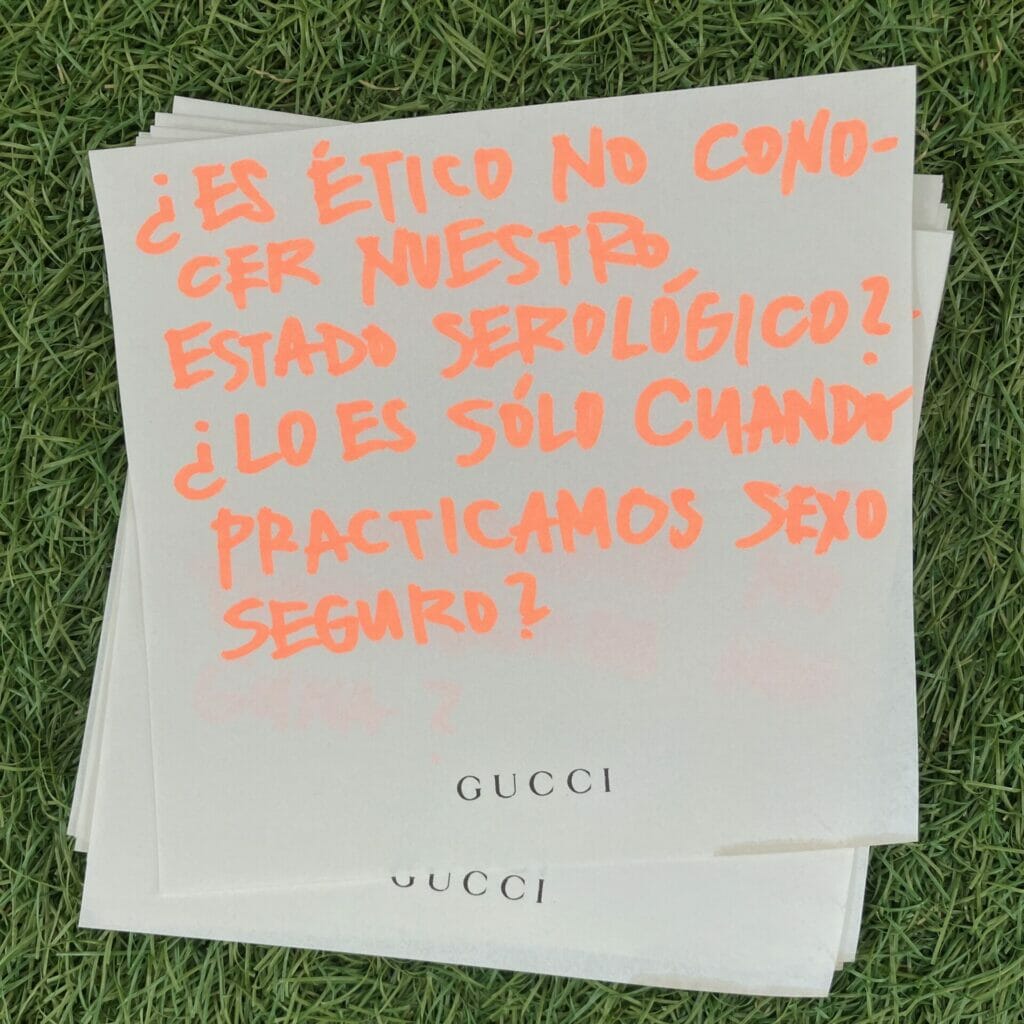

HOLD THAT POS+ FOR ME!
We conclude that you as Houses are important players in the field of HIV and prevention. You are one of the most important care networks in the community. But we think that you can do even more:
Fight stigma on all levels!
Build and protect a safe space for communication about being HIV positive (including for non-out pos+ people)!
We also want to encourage you to provide (or inform about) testing, to support people to know about their serological status, and to talk about STIs, treatment and safer sex.
Speak out publicly for the right to access therapy for all, even for those without health insurance! Help to find health care/health insurance for the ones in need as best as you can!
Though most actions are indeed the responsibilities of the Colombian state through its Ministry of Health and Social Security, we think that you can contribute by speaking out and calling for seropositives rights to information, treatment and medical insurance.
Ballroom has a history (in specific contemporary historical circumstances): Lets create a space for memorising, mourning and telling the history of our scene!
Additionally, PrEP has a great potential to break the spiral of new infections and offers the chance to destigmatize HIV/AIDS at the same time. Let’s fight together for broad access: PrEP for all who need it!
These are some of the thoughts we have on this topic. Many questions are open and we have written down some of them on notes presented to read for everyone at the KIKI VIRAL. See photos!
We look forward to seeing you soon and continuing to start great things together! However, you can always write to us and we will be there for you.
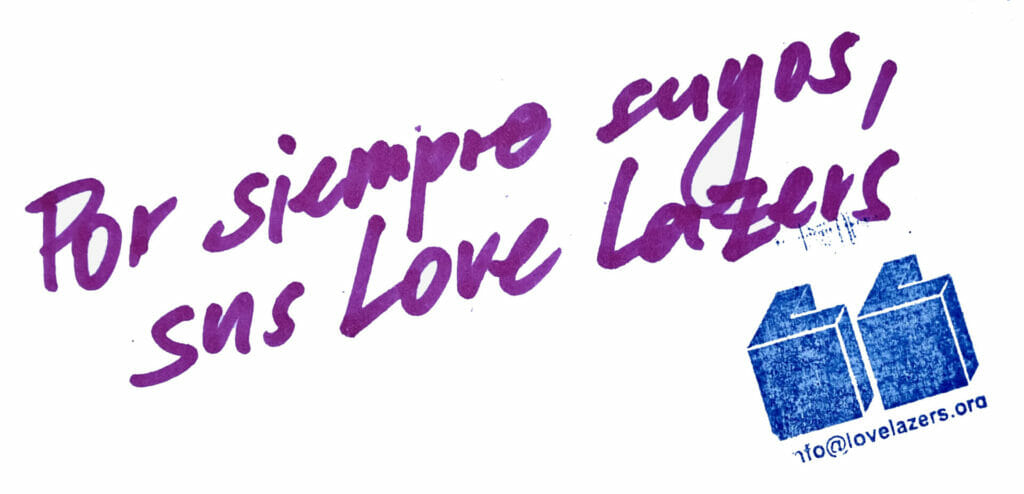
Forever yours!
Your Love Lazers
© Love Lazers, 2023. Todos los derechos reservados por Love Lazers. Foto: Diashi, Misteika after the Ball, 2023. La campaña Colombia 2023 cuenta con el apoyo financiero de Hot Club Zürich, Q-tekk Berlin y about blank Berlin.
